- Home
- Peter F. Hamilton
Judas Unchained cs-2 Page 8
Judas Unchained cs-2 Read online
Page 8
“Do we know where this Robin Beard is?” Alic asked; he tried not to seem too excited, that would be unprofessional, but the agent did sound like a very promising lead.
“I’ve got Vic Russell working on it as a priority. Last known address was on Cagayn. Vic’s on the express out there now; there’s a liaison with local police already set up.”
“Excellent.”
“What about Mars?” Tarlo asked. “We can’t just ignore it.”
“Well here’s the interesting thing,” Renne said. “Cufflin never transmitted anything to Mars through the observatory link, no coded instruction to shut down. So in theory, the remote station and whatever the Guardians placed there is still operating. It’ll send another signal in eight days’ time. The UFN Science Agency is putting together a group of planetary scientists to analyze the data for us and see if it is from environmental sensors.”
“Eight days?” Tarlo said scathingly. “Come on! Commander, they were desperate for this data. We have to investigate this now.”
Alic wanted to agree, but the cost of actually sending a forensic team to Mars would be phenomenal. Diverting a CST wormhole, even an exploration division one, would cost millions. That kind of procedure would have to be authorized by the Admiral. “Why can’t the observatory get in touch with the Mars remote station today? There must be some kind of communications protocol to run diagnostics on the systems up there. It’s got to be cheaper, probably quicker, too.”
Renne gave a shrug. “I suppose so. I can ask Jennifer Seitz, the director.”
“Do that. Let me know.” He smiled in satisfaction. Good clean decisions, proper leadership: everyone profited.
“Sure.” She took another sip of her coffee.
“Some good news for you, Chief,” Tarlo said. He shot Renne a malicious smile across the table.
“Go.”
“We’re making headway on McFoster’s financial data records. I need a warrant to open his accounts at Pacific Pine Bank; they’re guarded. Once we can study his spending pattern we can draw up a profile of his movements. We’ll also find out where his money came from.”
“Onetime account, cash deposit,” Renne said, and grinned over the top of her mug. “They always are. Untraceable.”
Tarlo showed her a stiff finger.
“You’ll get the warrant in an hour,” Alic promised. “All right, this isn’t as bleak as it looked back there in the junction. We can crack this, I know we can.”
CHAPTER TWO
Technically the War Cabinet should have had its meeting in the Presidential Palace on New Rio because the President herself was the chair, and ultimately held responsibility for all Commonwealth policy. That was the structure laid out in the Commonwealth constitution. Realpolitik was a little different.
None of the Intersolar Dynasty leaders present—Nigel Sheldon, Heather Antonia Halgarth, Alan Hutchinson, and Hans Braunt—were keen to be absent from their respective planets for long. And as Earth provided direct train links to all the Big15, it was their preferred choice of world. The senators—Justine Burnelli, Crispin Goldreich, and Ramon DB—were based on Earth anyway. And the two admirals, Kime and Columbia, certainly didn’t have the clout to nominate a different location, not after the public beating the navy was taking after the Lost23—however unfair it might have been.
Patricia Kantil had no option but to bow to the majority. It might have been the navy that was taking the brunt of the criticism in the media, but the unisphere polls were revealing a significant percentage questioning the overall leadership. Much as it irked her, she arranged for the meeting to be held at the Senate Hall in Washington, DC.
The participants assembled in one of those secure underground rooms so beloved of governments whenever they constructed emergency facilities. In an age when force fields could deflect atom laser shots and hundred-megaton blasts with relative ease, Patricia didn’t really see the point of digging out warrens of rooms a hundred meters below the aging Senate Hall building. But for the lack of windows, the chamber could have been any high-status corporate boardroom. A long tarnwood table sat atop an emerald carpet patterned with a huge Intersolar Commonwealth seal. Portraits of every past Senate First Minister gazed down at the table with various expressions of superiority. All very somber and expensive; typical of a budget that would never be held up to public scrutiny.
The War Cabinet all stood when Elaine Doi entered the room. Following two paces behind her, Patricia was quietly pleased to see that courtesy was extended, at least; the true powers in the Commonwealth were still acknowledging formal procedures—for the moment. None of the other cabinet members had aides with them; Patricia was the only one. She couldn’t actually recall being in the physical presence of quite so many masterclass players before. It was intimidating, even for someone as familiar with the process of high government as she. And she knew Elaine was nervous; for once not just about her own term. The latest batch of statistics from the Prime assault was shocking.
Elaine took her place at the head of the table and asked the others to be seated. Patricia sat at her left, with the First Minister, Oliver Tam, on her right. The tall double doors closed, and the chamber was automatically screened. Everyone lost contact with the unisphere.
“Isn’t the SI attending?” Crispin asked churlishly.
Elaine glanced at Patricia and gave a small nod of permission. “Not at this stage,” Patricia said. “Although it appears to be as disturbed as we are by the invasion, and it provided a great deal of assistance at the time, we still cannot be certain about its ultimate allegiance. As it is humans who are facing the brunt of the Prime attack, we feel that we alone should determine our response. If we decide we need its aid or advice, we will of course ask. Until then, the fundamental decision-making process should be ours and ours alone.”
If Crispin was annoyed at her reply, he didn’t show it.
“Thank you,” Elaine said. “I now call this first meeting of the War Cabinet to order. It is here today that we must determine the nature of our response to the clear and absolute threat posed by the Prime aliens. I don’t feel I under-state the enormity of the task we face when I say the outcome of this meeting could well determine not just the future of humanity as a species, but even if we have a future. The decisions we are faced with will be extremely difficult, and no doubt unpopular in some quarters. I for one am quite prepared to sacrifice popularist action in preference to do what is both right and necessary. I would like to call on Admiral Kime to give us a brief summary of the terrible assault we have endured, and then the navy’s analysis of what we might expect next from the Primes. When we have all absorbed that, I shall open the floor to policy decisions. Admiral.”
“Thank you, Madam President.” Wilson Kime looked around the table, saddened at the lack of friendly faces. “We all know it was bad. We knew the size of the Prime civilization at Dyson Alpha, and the kind of resources it has available to it, yet our initial preparation was wholly inadequate. The reason for that is quite simple: we refused to believe that an attack on this scale would ever happen. There simply is no rational explanation for it. We have seen that the Prime civilization’s industrial capacity is probably equal to if not larger than that of the entire Commonwealth. If they needed expansion space and more material resources, then it would be considerably cheaper for them to exploit star systems next to their own, rather than come after ours. Yet they chose not to follow a logical development pattern. They found out about us from Bose and Verbeken, and almost the first thing they did was build a series of wormholes to reach us. It looks as if the worst-case scenario for the envelopment was right: someone set up the barrier around Dyson Alpha to keep them contained.”
“What about Dyson Beta?” Alan Hutchinson asked.
“It remains an unknown,” Wilson said. “As does the reason for the Dyson Alpha barrier coming down. What we have to address today is the consequence of the Primes being freed. As a result of their attack, we now estimate the human death to
ll on the Lost23 planets to be approximately thirty-seven million.”
There was total silence around the table. Most of the cabinet stared down at the glossy wooden surface, not wanting to make eye contact with each other.
Wilson cleared his throat self-consciously and continued. “From the nature of the attacks, and the intelligence we have gathered subsequently, it appears that the aim of the Primes is to secure the industrial facilities on the Lost23 planets. Unlike us, they don’t appear to care about preserving the planetary environments. What we saw of their homeworld seems to support this; it was massively industrialized, and the pollution was orders of magnitude beyond anything we experienced here on Earth during the worst of the twenty-first century. Their priorities, therefore, are completely different from ours. That made them very difficult to predict. However, now they are in the open and we’re able to observe their activities directly, we can determine what actions they will have to pursue next. For instance, they will have to build up their occupation forces on the Lost23 in order to utilize them properly and secure them against any counterstrike we make. They will also mount a second attack against the Commonwealth, then a third, and a fourth. They will keep on attacking and pushing us back and back onto fewer worlds until we have none left.”
“What makes you certain of that?” Heather asked.
“We are at war,” Wilson said. He saw her glossed lips tighten at the phrase, censure leaking out of the flawless skin of her mid-fifties face like trace pheromones. Even though she was in a chic formal dark blue suit with her ginger hair folded into a neat braid, there was no way of disguising the authority she possessed. Heather was the only female head of a Big15 Intersolar Dynasty, her feminine appearance a very thin cloak worn over ruthless ambition and a razor-sharp political instinct. Just like him, and everyone else seated around the table, she hated being given bad news.
“War by its nature cannot be a static situation,” he continued, meeting her stare levelly. “They know that we will never accept the loss of those twenty-three planets. Either they continue to expand across the Commonwealth, wiping us out of galactic history, or we will do the same to them.”
“Are you suggesting we commit genocide against them?” Ramon DB asked lightly.
“Are you suggesting we become the victims of genocide?” Wilson countered. “This is not a war as we have fought them before. This is not a strategic struggle over key resources; we’re not fighting for control over tribal lands, or trade routes to the new colonies. Both us and the Primes are intersolar, there is no shortage of anything in the galaxy. They came here with one purpose, to kill us and to capture our worlds.”
“In that case we have experienced an analogous war in our history,” Hans Braunt said. “It would seem as if they are waging a religious crusade against us.”
“You could be right,” Wilson said. “Religion or some ideological variant of it was certainly one of the more popular theories among the strategic analysis teams. Their motivation can’t easily be explained any other way.”
“We can worry about the reason later,” Nigel said. “You’ve summarized where we stand. What does the navy want to do next? What do you need?”
“We’re proposing to meet the Prime aggression with a three-stage approach. First, a heavy infiltration and sabotage offensive on the Lost23; tie the Primes up on each planet, slow them down, divert their resources away from readying their next attack while we prepare for stage two.”
“I’m curious about the kinds of forces you envisage to pull that off,” Alan Hutchinson said.
“Commando-style troop units will be dropped onto the Lost23 through wormholes that will open for a very short duration. They’ll cause as much disruption as possible, combined with a comprehensive intelligence-gathering operation. So far we know very little about the Primes. This should help expand our knowledge base considerably. We’re hoping to perform several snatch missions so we can begin interrogation and memory reading procedures.”
“Just what kind of numbers are you talking about here?” Alan asked keenly. “To make any decent impact you’re going to need a lot of these guerrilla fighters.”
“We’re planning on sending an initial force of around ten thousand troops to each planet.”
“Ten thous…Christ, man, you’re talking about raising an army of a quarter of a million people.”
“We don’t see that as a problem,” Rafael said smoothly. “The new navy ground troop service will be opened to volunteers from the general population, of course; and history shows we’ll have a great many aspirants. Even multilifers tend to get aggressive when threatened. And just in case, we have a large reserve of people who can be more easily persuaded; people, in fact, more suited to this kind of work than most.” He opened his hands wide in reasonable appeal. “Please, most of the last few days have been spent drawing up these responses, and examining their feasibility; we’re not throwing out panic ideas here. Deploying these troops is not only possible, it is essential. We must regain the initiative.”
“Very well,” Hans said. “What’s stage two?”
“A fleet,” Wilson said flatly. “A very big fleet of warships. Not the kind we have now. We need to approach this from a radical perspective. We have to consider starships like the Second Chance and the StAsaph as our Kittyhawks, not even prototypes. We were lazy back then, putting together what we could with damn near off-the-shelf components.” He glanced over at Nigel. “I’m not criticizing; they were right for the time, but this is a new age that could well see us obliterated if we don’t recognize it. We need fast ships, not with marque five or six hyperdrives that are on the drawing board; I need a marque ten or more, a speed that can take us to Dyson Alpha in a week. They’ve got to be well protected, shields as strong as the original Dyson barriers were. They’ve got to have real weaponry, not nuclear missiles, not energy beams; give me relativistic attack drones, each warship loaded with a salvo of a hundred of the damn things which can all strike with the same power the Desperado unleashed. And most of all, I need thousands of them. Not dozens, not hundreds: thousands—enough to challenge that goddamn armada of ordinary ships which the Primes have. During their attack on the Lost23, they sent over thirty thousand ships through those wormholes; and they’ve got a hundred times that many back in their home system. If we’re going to go up against them, then we need to put the industrial output equivalent to a Big15 behind this effort, churn them out the way we do cars and trains.
“FTL ships are the sole advantage we have over the Primes right now. They don’t have them. If we can get that advanced technology working and deployed, then we stand a chance. With the kind of strike mobility I’m talking about we can outmaneuver them at a strategic level. We can block their next attack—that’s our second stage. Then after that we can scour space between here and Dyson Alpha to find out where that bastard Hell’s Gateway staging post is, and destroy it—stage three, threat elimination.”
“Sounds good to me,” Nigel said; he nodded his approval. “At least you’re talking the talk, thinking outside the box. We need that badly.”
“It’s bloody expensive talk,” Crispin murmured.
“I don’t believe you just said that,” Justine shot at him. The unexpected sharpness in her tone made everyone turn to look at her; it was pure Gore.
“Thirty-seven million humans dead, and you’re complaining about the cost of defending ourselves. Didn’t you hear what the Admiral just told us? The alternative is death. Real death, not just an inconvenient sleep-of-absence while your clinic grows you a new body. You will die, Crispin. And that lasts forever.”
“I wasn’t saying it was too expensive, my dear. I’d just like to point out that our finances will have to undergo a similar radical restructuring to pay for it. That’s if this wonderful new technology can be made to work.” He looked pointedly at Nigel, then Wilson.
“The theories are perfect,” Nigel said evenly. “Getting them to work in practice…well, Crispin, that’s where
all your money comes in.”
“It’ll be your taxes that get raised,” Crispin pointed out.
“And do you really think any of us gives a flying fuck about that right now? Get the Treasury to crunch the numbers, slap twenty or forty percent on taxes, work out the loans and bond issues we’ll have to float. Nobody cares about the inflation or recession or unsustainable growth it’ll cause. None of that crap matters if we lose. If we don’t have the money available to make this work there won’t be any finance market. We’ll be dead; we at this table have to recognize this even if we can never say so in public.”
“It’s not just finance,” Heather said. She nodded in Wilson’s direction. “I like your thinking on this.”
“Team effort,” he grunted.
“Sure, but your team’s heading in the right direction. We have to think way out of the left field and cooperate for a change. What gives me a fright is trying to realign our manufacturing capacity on this scale. It won’t be smooth, yet it must be done.”
“The SI could probably help,” Oliver Tam said.
“Possibly,” Heather said. She sounded like a schoolmistress displeased with a disruptive pupil. She exchanged a look with the other three Dynasty heads. “We’ll need to pull the rest into line.”
“They’re smart enough,” Nigel said. “And we have our own arrangements between ourselves.”
Heather gave a small shrug.
“What about the refugee situation?” Ramon DB inquired. “What place do they have in all these plans? Right now we have the entire surviving population from the Lost23 saturating the rest of the Commonwealth; they have no homes, no jobs, no life left. They look to us, to government, for leadership, some acknowledgment of their plight. There are hundreds of thousands of people flooding into Silvergalde, which can’t cope. I’m told the outside of Lyddington is beginning to resemble some kind of medieval refugee camp, with no water, no sanitation, and precious little food. And there’s the one big problem which I haven’t heard raised here today: the displacement. People on every world within a hundred light-years of the Lost23 are either taking vacations on the other side of the Commonwealth or trying to sell up and buy a house on a world where they think they’re going to be safe. They are afraid, and with good reason. What do we do about this? We must show them we know and understand their situation. That we will take action to resolve it.”

 A Night Without Stars
A Night Without Stars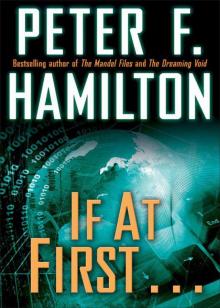 If at First . . .
If at First . . . The Neutronium Alchemist
The Neutronium Alchemist Great North Road
Great North Road Misspent Youth
Misspent Youth Pandora's Star
Pandora's Star The Evolutionary Void
The Evolutionary Void The Dreaming Void
The Dreaming Void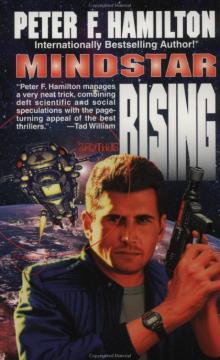 Mindstar Rising
Mindstar Rising The Temporal Void
The Temporal Void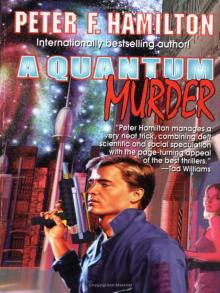 A Quantum Murder
A Quantum Murder The Hunting of the Princes
The Hunting of the Princes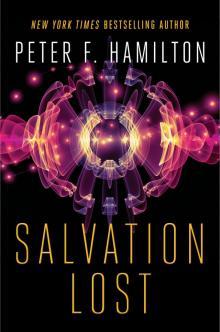 Salvation Lost
Salvation Lost The Dreaming
The Dreaming Salvation
Salvation Light Chaser
Light Chaser The Mandel Files, Volume 2: The Nano Flower
The Mandel Files, Volume 2: The Nano Flower![The Saints of Salvation [British Ed.] Read online](http://i1.bookreadfree.com/22/the_saints_of_salvation_british_ed__preview.jpg) The Saints of Salvation [British Ed.]
The Saints of Salvation [British Ed.] Manhattan in Reverse
Manhattan in Reverse The Secret Throne
The Secret Throne A Window Into Time
A Window Into Time A Second Chance at Eden
A Second Chance at Eden The Nano Flower
The Nano Flower The Confederation Handbook
The Confederation Handbook The Naked God
The Naked God The Saints of Salvation
The Saints of Salvation The Void Trilogy 3-Book Bundle
The Void Trilogy 3-Book Bundle The Abyss Beyond Dreams
The Abyss Beyond Dreams A Voyage Through Air
A Voyage Through Air Judas Unchained
Judas Unchained The Commonwealth Saga 2-Book Bundle
The Commonwealth Saga 2-Book Bundle The Naked God - Flight nd-5
The Naked God - Flight nd-5 Night Without Stars (Chronicle of the Fallers Book 2)
Night Without Stars (Chronicle of the Fallers Book 2) Neutronium Alchemist - Conflict nd-4
Neutronium Alchemist - Conflict nd-4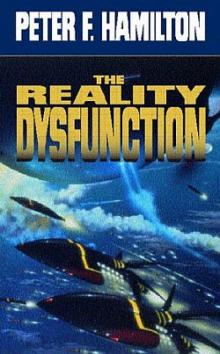 Reality Dysfunction - Expansion nd-2
Reality Dysfunction - Expansion nd-2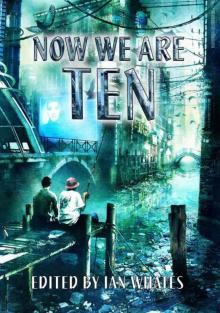 Now We Are Ten: Celebrating the First Ten Years of NewCon Press
Now We Are Ten: Celebrating the First Ten Years of NewCon Press Neutronium Alchemist - Consolidation nd-3
Neutronium Alchemist - Consolidation nd-3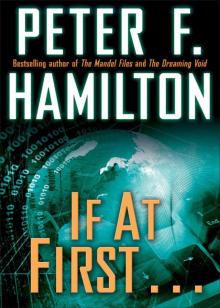 If at First . . . (Short Story)
If at First . . . (Short Story) A Second Chance at Eden nd-7
A Second Chance at Eden nd-7 Judas Unchained cs-2
Judas Unchained cs-2 The Mandel Files, Volume 1
The Mandel Files, Volume 1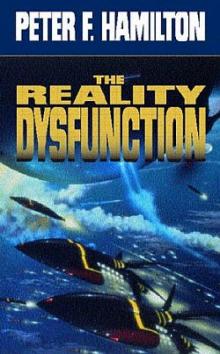 Reality Dysfunction — Emergence nd-1
Reality Dysfunction — Emergence nd-1 The Temporal Void (ARC)
The Temporal Void (ARC) The Mandel Files
The Mandel Files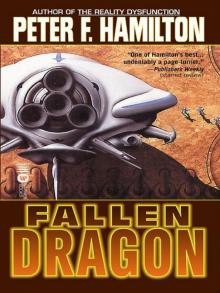 Fallen Fragon
Fallen Fragon Misspent Youth (commonwealth saga)
Misspent Youth (commonwealth saga)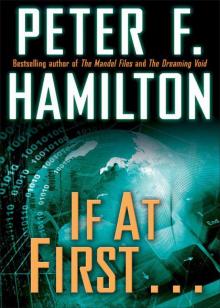 If at First...
If at First... Best of British Science Fiction 2016
Best of British Science Fiction 2016 The Mandel Files, Volume 2
The Mandel Files, Volume 2 The Naked God - Faith nd-6
The Naked God - Faith nd-6 The Night's Dawn Trilogy
The Night's Dawn Trilogy Pandora's Star cs-2
Pandora's Star cs-2 A Window into Time (Novella)
A Window into Time (Novella)